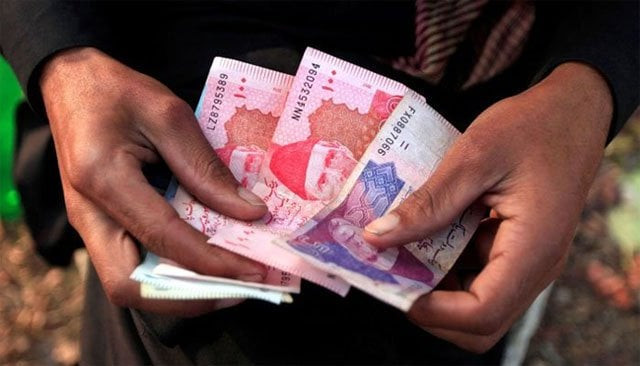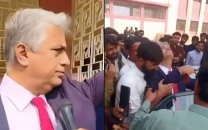ECC approves fresh borrowing of Rs50b to pay circular debt
Govt will ask NEPRA to add 55 paisa per unit to consumer tariff to cover the cost of debt

Govt will ask NEPRA to add 55 paisa per unit to consumer tariff to cover the cost of debt. PHOTO: REUTERS
The decision was taken just one week before the tenure ends of the current government that failed to address the power sector’s bottlenecks despite declaring it as its top priority.
The ruling Pakistan Muslim League-Nawaz (PML-N) party also lost the opportunity provided by low crude oil prices and did not undertake reforms in the sector.
Pakistan needs to watch out as CPEC-related debt soars
Headed by Prime Minister Shahid Khaqan Abbasi, the Economic Coordination Committee (ECC) of the cabinet agreed on borrowing Rs50 billion as syndicated term finance facility through Power Holdings Private Limited (PHPL) - a subsidiary of the Ministry of Energy, according to officials at the Prime Minister’s Office.
The PM Office did not release any statement after the ECC meeting.
The ECC also approved the imposition of a debt servicing surcharge on consumers in the range of Rs1.15 to Rs1.75 per unit to pay back the loans parked in PHPL, which would rise to Rs730 billion after fresh borrowing.
The government has injected Rs230 billion into the power sector in the past two months in the hope that it will keep power generation plants running through upcoming general elections. The PML-N had come to power on the promise of ending load-shedding and addressing the sector’s governance issues.
Consumers will bear the cost of servicing the bank loans. The fresh borrowing of Rs50 billion will lead to imposition of another surcharge of 55 paisa per unit subject to approval of the National Electric Power Regulatory Authority (Nepra).
It is the third bank borrowing since March this year that the government has made to reduce the circular debt, which has already crossed Rs1 trillion including the money parked in PHPL.
In March, the government approved borrowing of Rs80 billion in commercial loans through PHPL. The amount has already been disbursed. However, the Ministry of Finance did not adjust Rs14 billion of Azad Jammu and Kashmir subsidies against savings of the same amount from the Fata general sales tax.
In April, the ECC allowed borrowing of Rs100 billion from commercial banks for reducing the circular debt. Of this, Rs50 billion had been disbursed while the remaining Rs50 billion was in the pipeline, the Power Division told the ECC.
Despite the Rs180-billion injection, the “financial position of power sector is still at a critical level due to various reasons including less than the regulatory benchmark performance both in terms of losses and recovery, unavailability of subsidy, delay in tariff determination”, said the Power Division.
The ministry admitted that “higher energy sales due to a significant increase in the generation base, has also contributed to the circular debt build-up” - an admission that it has failed to improve recoveries and reduce line losses.
Two days ago, the authorities discussed the crippling power-sector situation and came to the conclusion that power plants could not run smoothly without retiring some of the outstanding circular debt, said officials of the finance ministry.
However, the ministry refused to provide any fiscal support due to budgetary constraints, they added.
ICCI concerned over rising external debt
The ECC was informed that the servicing of debt already parked in PHPL would cost Rs1.15 to Rs1.75 per unit. The government would now ask Nepra to add another 55 paisa per unit to the consumer tariff to cover the cost of the new loan of Rs50 billion.
The ECC approved another summary of the Power Division, seeking regularisation of Rs1.01 billion that the government had to pay to a consortium of banks to convince them to provide fresh Rs50 billion in loans. Banks had demanded settlement of the overdue principal of Rs1.1 billion before extending a fresh loan facility.
The ECC also approved repayment of another Rs5.92 billion outstanding principal loan to commercial banks.
Published in The Express Tribune, May 25th, 2018.
Like Business on Facebook, follow @TribuneBiz on Twitter to stay informed and join in the conversation.



















COMMENTS
Comments are moderated and generally will be posted if they are on-topic and not abusive.
For more information, please see our Comments FAQ